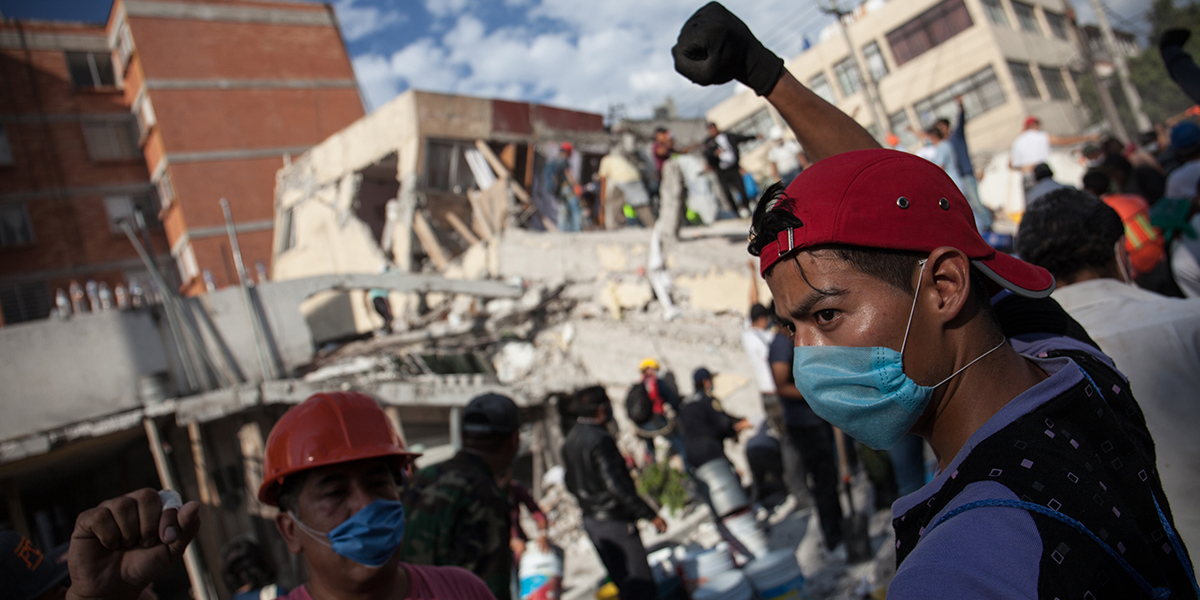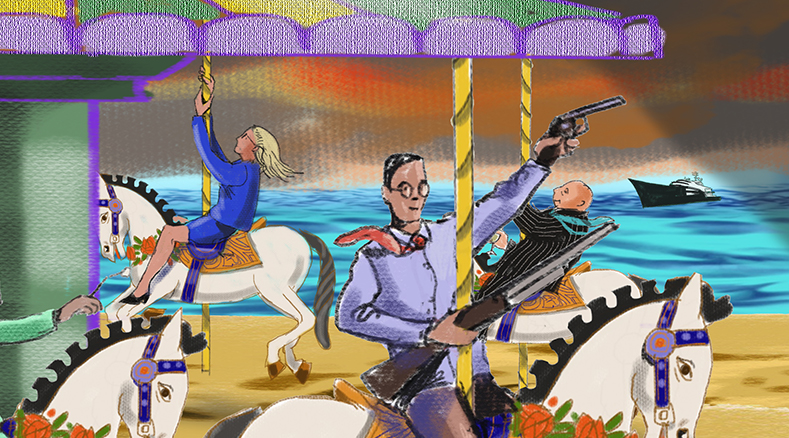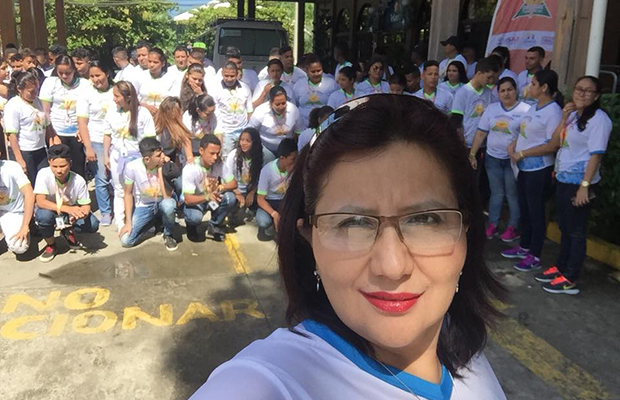At 1:14 p.m. on September 19, 2017, disaster struck members of the close-knit Mexican team of reporters working on the Paradise Papers.
A powerful earthquake shook Mexico City and Puebla, killing more than 200 people and destroying buildings and bridges. Among the ruined structures was the apartment building where Proceso reporter Jorge Carrasco and Univision correspondent Peniley Ramirez lived. The husband and wife were among the small team of journalists who had worked together in secret to uncover the offshore dealings of Mexico’s elite.
Ramirez was working at home when the quake hit and was afraid that the entire building was about to collapse. Then she found that she couldn’t get out of their fourth floor apartment.
“I was trapped because the door wouldn’t open,” Ramirez said. “I was sure that was my last day.”
Eventually, a neighbor came, broke down the door and helped bring her downstairs.
The disaster threw a frightening wrench into a groundbreaking collaboration among Mexican journalists.
For months, reporters from four outlets – Mexicanos Contra la Corrupción, Proceso, Quinto Elemento Lab and Univision – had been meeting roughly every other week to discuss the investigation. They bonded while working together on the project, often meeting in each other’s homes.
Some of those meetings took place in Carrasco’s and Ramirez’s apartment, where they served wine, cheese and savory pastries called pastelitos as the reporters discussed their findings.
“The atmosphere was work but even more so it was friendship,” said Mathieu Tourliere, a reporter with Proceso who reviewed the leaked documents and identified many of the Mexican stories. “In Paradise Papers, we had absolute collaboration.”
For Ramirez, 31, it was an opportunity to work with leading Mexican journalists whose reporting she had long admired, such as ICIJ member and 2013 Pulitzer Prize winner Alexandra Xanic.
Ramirez cooked her famous chocolate bread for her new partners and relished the chance to collaborate with them as peers deciphering the complex offshore dealings in the Paradise Papers database.
“Those meetings in my apartment, for me every meeting was a lesson,” Ramirez said. “You’re not just talking about the database, you’re talking about a new understanding of how the world works.”
Then, less than two months before publication, the earthquake struck, and the apartment was destroyed. Not only were Carrasco, Ramirez and their children forced to contend with the damage and to find a new home, but newsrooms across Mexico were swept up in covering the aftermath.
“It came at the worst time,” Tourliere said. “It had a huge effect on us because we were coming into the final stretch.”
On top of her own disaster, Ramirez had to report for Univision on the quake’s devastating impact. Days after her apartment was destroyed, she was assigned to report on a story of 19 children in a school who were killed when the building collapsed. She found they died in part because an illegal apartment had been built on the school’s roof, adding extra weight that contributed to the building’s disintegration.
The work is like a moment of peace… It was a relief for me.
The trauma from her near-death experience and the ongoing stress of her work left Ramirez perpetually fearful, unable to eat or sleep.
Despite the disaster that had upended their newsrooms and their lives, Ramirez and the rest of the team buckled down to complete the investigation. Ramirez found that working on the Paradise Papers provided a sense of calm and purpose.
“The work is like a moment of peace,” she said. “It was a relief for me.”
On November 5, when the Paradise Papers was launched worldwide, the Mexican team published stories revealing powerful politicians, union leaders and religious figures who had used offshore structures to conduct their business out of sight.
One of the most significant stories revealed that the late union leader Joaquin Gamboa Pascoe had bank accounts in the Cayman Islands and Bahamas that held nearly $19 million. Gamboa was famous during his heyday for displays of personal wealth and once answered criticism of his lifestyle: “What, because the workers are screwed, that means that I should be too?”
He also served for six years in the Senate as a member of Mexico’s longtime ruling party, the Partido Revolucionario Institucional (Institutional Revolutionary Party), and his union was known for its close political ties to the PRI.
“It was a union that did not protect workers rights and made pacts with those in power to control social movements,” Tourliere said. Leaders like Gamboa used offshore accounts, he said, because they “needed these structures to hide how they enriched themselves.”
Another major story in Mexico, which Ramirez helped to report, revealed a series of offshore companies connected to the religious order Legionaries of Christ. Founded in Mexico in 1941 by Marcial Maciel Degollado, the Legion earned substantial sums by establishing a chain of private religious schools.
The Paradise Papers revealed that in 1994, as Maciel was expanding his educational empire, he and other top leaders of the Legion set up a company in Bermuda to handle the millions of dollars in fees that the schools were earning each month.
In 2005, Maciel stepped down as head of the Legionaries amid allegations that he had sexually abused numerous youths and young men who had studied under his tutelage in the church.
The Mexican team has continued to publish Paradise Papers stories for months after the project’s launch.
Yesterday, Proceso, Univision and the Los Angeles Times, in partnership with fellows at the Columbia Graduate School of Journalism, published an investigation of catastrophe bonds. These are short-term bonds that transfer the risks of catastrophic losses from events such as natural disasters from insurers to investors, who earn periodic payments during the life of the bond. If the catastrophe as defined in the bond occurs, investors may lose some or all of the principal. However, as one study noted, the interest rate earned on the bonds “has so far been high compared to the risk of default.”
Tourliere reviewed the Paradise Papers and official documents related to catastrophe bonds in Mexico – shifting in a period of months from surviving a disaster to holding the government accountable for its promises on disaster recovery.
The investigation found that catastrophe bonds failed to deliver desperately needed payouts, effectively shifting public money slated for recovery from natural disasters into the hands of private investors. Catastrophe bonds pay out based on the severity of conditions, such as the atmospheric pressure in the eye of a hurricane. However, in the case of the destructive hurricanes Odile in 2014 and Patricia in 2015, private weather data provided by a single independent storm chaser found higher atmospheric pressure – and thus less severe storms – than government sources such as the U.S. Air Force Reserve or U.S. National Oceanic and Atmospheric Administration. The use of private rather than official readings allowed investors to avoid making roughly $100 million in payouts to the Mexican government.
The pattern was all too familiar to Tourliere.
“It’s what we’re seeing in the reconstruction of the damage from last September’s earthquake: its deeply opaque, there’s discretionary use of money, and money is misappropriated,” he said. “And, as always, the poorest and most vulnerable are cheated.”
Read more about the challenges our members and partners face when reporting in our Inside Story series:
- Increased Economic And Political Pressure Puts Investigative Reporting At Risk In Poland
- Through death threats and scare tactics, Honduran reporter ‘perseveres’
- Cross-border collaboration: the antidote to censorship and press intimidation in Thailand
- How to work on a high-tech global project with limited internet, phone connection



